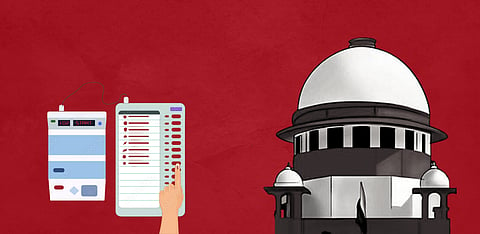

The petition prayed to replace the party symbol with the candidate's name, age, qualification and photographs to enable the voters to make an informed decision on credibility.
– –
ON Tuesday, a Supreme Court division bench comprising Chief Justice of India ('CJI') Uday Umesh Lalit and Justice Bela M. Trivedi, in the case of Ashwini Upadhyay versus Union of India, disposed of a writ petition that prayed for removing political party symbols from Electronic Voting Machine ('EVM') ballots.
On behalf of the petitioner, advocate Vikas Singh submitted that the inclusion of the name, age, qualification and photograph of a candidate instead of the party symbol would enable voters to make an informed choice. He argued that the exclusion of political symbols would enable the voting to be inclined in the favour of a credible person, and not because the candidate belongs to a particular political party. Singh clarified that the petition does not challenge the Election Symbols (Reservation and Allotment) Order, 1968, but only the use of political party symbols on EVMs or paper ballots.
The CJI noted that after the introduction of the Tenth Schedule into the Constitution, the Constitution recognises political and legislative parties. He observed that when the electorate has elected someone belonging to a political party, their election is "integrally connected" to the political party they belong to. "If the candidate has been nominated by a Political Party and his name appears along with the party symbol, what is wrong or obnoxious with that?", the CJI enquired.
Senior Advocate Gopal Sankaranarayanan, representing the petitioner, clarified that the petition concerns itself with Articles 324, 325, and 326 of the Constitution regulating the superintendence of elections by the Election Commission, whereas the Tenth Schedule is attracted at a later stage. He emphasised that a local candidate who has been working tirelessly in an area and deserved to be elected gets ultimately neglected, with the political party taking precedence on account of the symbol on the EVMs. This is violative of the fundamental rights under the Constitution, he submitted. Sankaranarayanan contended that the rise in the number of elected candidates with criminal antecedents, with 43 per cent of elected representatives with declared criminal cases shows that the disclosure mandate of criminality is not helping.
In a country that continues to have illiteracy, corruption, and black money, replacing the political party symbol is vital to ensure 'good people' are elected, Sankaranarayanan further remarked.
According to Singh, neither the Election Commission is taking action about candidates with criminal antecedents standing for election, nor the legislature is keen on passing laws in that respect. Singh, thus, submitted that it is vital to educate voters by replacing the symbol of the political party with the name, age, qualification, and photograph of a candidate.
Singh prayed that for the present purposes, the ends of justice would be met if the representation made by the petitioner is considered by the concerned authorities.
Disposing of the petition, the division bench ensured assurance of the Attorney-General for India, R. Venkataramani, to consider such representation.